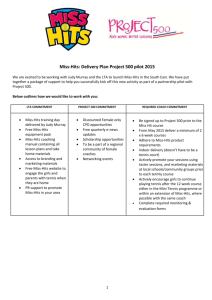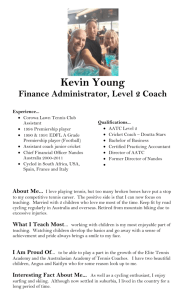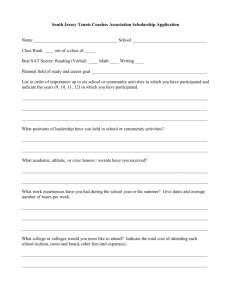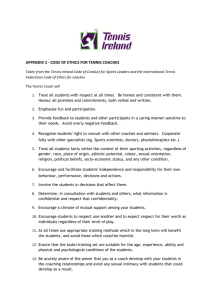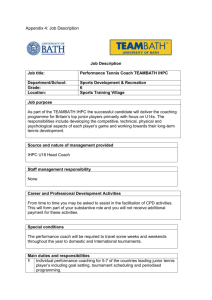PARENTS
advertisement
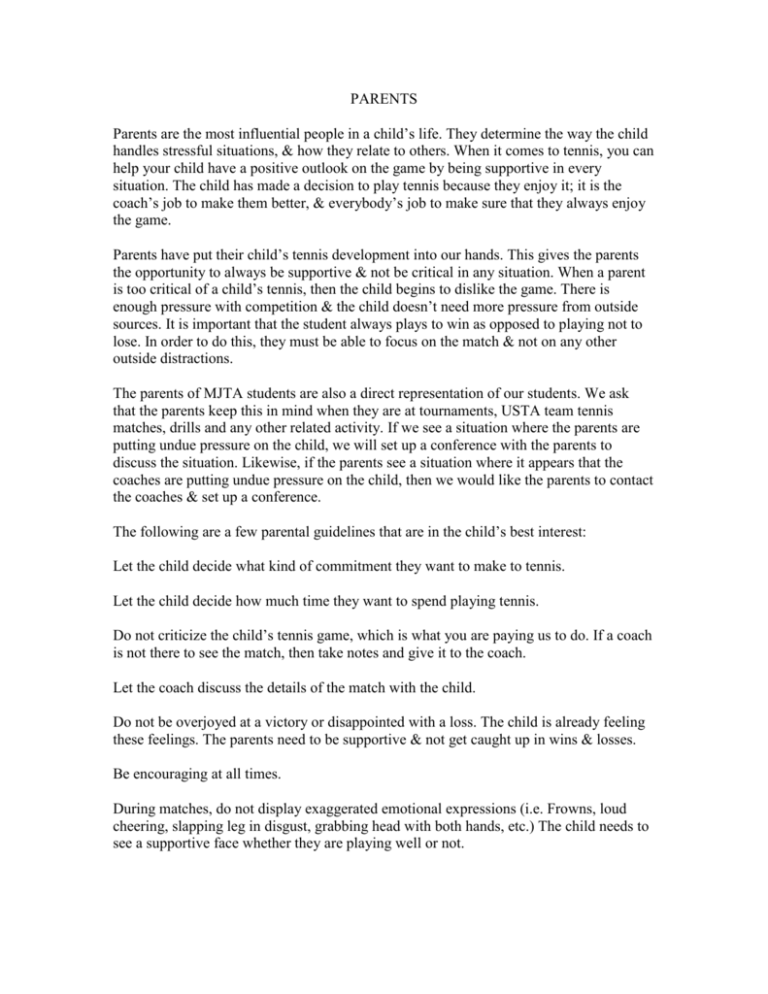
PARENTS Parents are the most influential people in a child’s life. They determine the way the child handles stressful situations, & how they relate to others. When it comes to tennis, you can help your child have a positive outlook on the game by being supportive in every situation. The child has made a decision to play tennis because they enjoy it; it is the coach’s job to make them better, & everybody’s job to make sure that they always enjoy the game. Parents have put their child’s tennis development into our hands. This gives the parents the opportunity to always be supportive & not be critical in any situation. When a parent is too critical of a child’s tennis, then the child begins to dislike the game. There is enough pressure with competition & the child doesn’t need more pressure from outside sources. It is important that the student always plays to win as opposed to playing not to lose. In order to do this, they must be able to focus on the match & not on any other outside distractions. The parents of MJTA students are also a direct representation of our students. We ask that the parents keep this in mind when they are at tournaments, USTA team tennis matches, drills and any other related activity. If we see a situation where the parents are putting undue pressure on the child, we will set up a conference with the parents to discuss the situation. Likewise, if the parents see a situation where it appears that the coaches are putting undue pressure on the child, then we would like the parents to contact the coaches & set up a conference. The following are a few parental guidelines that are in the child’s best interest: Let the child decide what kind of commitment they want to make to tennis. Let the child decide how much time they want to spend playing tennis. Do not criticize the child’s tennis game, which is what you are paying us to do. If a coach is not there to see the match, then take notes and give it to the coach. Let the coach discuss the details of the match with the child. Do not be overjoyed at a victory or disappointed with a loss. The child is already feeling these feelings. The parents need to be supportive & not get caught up in wins & losses. Be encouraging at all times. During matches, do not display exaggerated emotional expressions (i.e. Frowns, loud cheering, slapping leg in disgust, grabbing head with both hands, etc.) The child needs to see a supportive face whether they are playing well or not. Do not make derogatory comments towards the child’s opponent, opponent’s parents, opponent’s coaches or the tournament referees when talking to the child. If there is a problem it is better to write a letter to the proper authorities. During a match, if the child’s opponent makes a call do not signal to your child that it was in or out. You are not a line judge & the child has the opportunity to learn how to handle this situation. During a match, coaching is not allowed except between 2nd & 3rd sets. If coaching is necessary, let the coach do it. If a coach is not available, then talk to the child & ask then what they think they need to do. Again, be very supportive in this situation. Do not use signs to communicate strategies or any other information during a match; this can cause the child to forfeit the match. If you disagree with a coach during a match or drills, then discuss it later in private with the coach in question. Keep in mind that we want the child to get better & this is a process with many stages. Please do not interrupt drills or lessons to ask questions about techniques. Discuss later with coaches. Again, this is a process & it is our job to keep guiding them beyond their limits. We are asking that parents not come on to the court during drills or clinics. You are welcome to observe from outside the court. This helps the players stay focused & reduces distractions. We encourage you to communicate with the coaches. We want to know if the child is having trouble with school, if there are problems at home, or any circumstances that affect the child in a positive or negative way. We know you want the best experience for your child and are honored that you trust us with their development. We thank you for your support and look forward to sharing our experience with your child.

